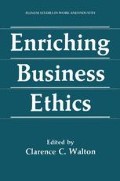Abstract
The new conservatism that captured America’s fancy in this, the Reagan decade, is actually two distinct conservatisms. It is an economic conservatism that has tried to dismantle the welfare state and turn as many facets of life as possible over to the free-market, private sector. And it is a moral conservatism that has attempted to strengthen traditional values and the social institutions that foster them. These two conservatisms correspond, of course, to the economic and social agendas that have guided the policies of the Reagan administration since the president took office. The president and his supporters seem to share not only the belief that free-market economics and traditional moral values are good but that they go together, that it is possible simultaneously to strengthen both.
If a man does away with his traditional way of living and throws away his good customs, he had better first make certain that he has something of value to replace them.
—Traditional African saying1
Access this chapter
Tax calculation will be finalised at checkout
Purchases are for personal use only
Preview
Unable to display preview. Download preview PDF.
Notes
Robert Ruark, Something of Value (New York: Random House, 1953), p. 15.
Barry Schwartz, The Battle for Human Nature (New York: Norton, 1986). This chapter is based largely on the book.
William Graham Sumner, Essays of William Graham Sumner (New Haven: Yale University Press, 1934), p. 344.
In R. L. Heilbroner, The Worldly Philosophers (New York: Simon and Schuster, 1960), p. 21.
Bernard Mandeville, The Fable of the Bees, Vol. 1, (London: Penguin, 1975), p. 42.
Adam Smith, The Wealth of Nations (New York: Random House, 1937), p. 119.
Adam Smith, The Theory of Moral Sentiments (Oxford: Clarendon Press, 1976), pp. 124–125.
Gary Becker, The Economic Approach to Human Behavior (Chicago: University of Chicago Press, 1976), p. 8.
Adam Smith, The Wealth of Nations, p. 325.
Charles Darwin, The Origin of Species (Cambridge: Harvard University Press, 1964), pp. 63–64.
Peter Medawar, cited in G.C. Williams, Adaptation and Natural Selection (Princeton: Princeton University Press, 1966), p. 158.
Michael Ghiselin, The Economy of Nature and the Evolution of Sex (Berkeley: University of California Press, 1976), p. 247.
Saul Bellow, cited in D. Symons, The Evolution of Human Sexuality (Oxford: Oxford University Press, 1979), p. 23.
Karl Polanyi, The Great Transformation (New York: Rinehart, 1944), p. 46.
Polanyi, p. 30.
Marshall Sahlins, The Use and Abuse of Biology (Ann Arbor, MI: University of Michigan Press, 1976), p. 68.
Mark Lepper, David Greene, and Richard Nisbett, “Undermining Children’s Intrinsic Interest with Extrinsic Rewards: A Test of the ‘overjustification’ Hypothesis,” Journal of Personality and Social Psychology, 1973, Vol. 28, pp. 129–137.
Barry Schwartz, “Reinforcement-induced Behavioral Stereotypy: How Not to Teach People to Discover Rules,” Journal of Experimental Psychology: General, 1981, 111, pp. 23–59.
Kenneth Arrow, The Limits of Organization (New York: Norton, 1974), p. 27.
William S. Vickrey, in E. S. Phelps, ed., Economic Justice (Hammondsworth: Penguin, 1973), p. 60.
Fred Hirsch, Social Limits to Growth (Cambridge: Harvard University Press, 1976), p. 101.
Hirsch, pp. 117-118.
Kenneth Arrow, “Gifts and Exchanges,” Philosophy and Public Affairs, 1972, 1, p. 357.
C. L. Schultze, The Public Use of the Private Interest (Washington, DC: Brookings Institution, 1977), p. 18.
John Galbraith, The New Industrial State (New York: Signet, 1960), p. 404.
Sahlins, p. 100.
Author information
Authors and Affiliations
Editor information
Editors and Affiliations
Rights and permissions
Copyright information
© 1990 Springer Science+Business Media New York
About this chapter
Cite this chapter
Schwartz, B. (1990). King Midas in America. In: Walton, C.C. (eds) Enriching Business Ethics. Springer Studies in Work and Industry. Springer, Boston, MA. https://doi.org/10.1007/978-1-4899-2224-3_7
Download citation
DOI: https://doi.org/10.1007/978-1-4899-2224-3_7
Publisher Name: Springer, Boston, MA
Print ISBN: 978-1-4899-2226-7
Online ISBN: 978-1-4899-2224-3
eBook Packages: Springer Book Archive

